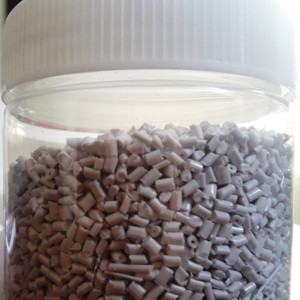| Taban Andish Berjis |

| No Title | 0.01 MB |
| Registration Date | 9 Jun 2019 |
| Revision Date | 9 Jun 2019 |
| Share |
Food Packaging
MasterbatchZinc oxide
ZnO Nanoparticle /Nanopowder CAS Number : 1314-13-2This product is known as an antibacterial PE-based masterbatch containing ZnO nanoparticles. It includes 17.17 Wt. % of ZnO. In nano-scale, ZnO particles produce the reactive oxygen species more than ZnO bulk and so higher antibacterial activity appears in ZnO nanoparticles. It shows high antibacterial activity according to INSO 10900 (Measurement of antibacterial activity on plastics and other non-porous surfaces). The following table clarifies how powerful it is against E.Coli and S.aureus bacteria. Antibacterial activity is defined as the ability of a material to eliminate the bacterial contacting with that. It is calculated by comparison of the logarithm of the number of the bacteria in the control sample and in the corresponding sample of that material.
Industrial and consumer polymers can be susceptible to microbial attack, causing undesirable effects such as staining, odors, and physical degradation. Bacteria and fungi feed on most plastic and polymer additives often leading to a potential loss of product integrity. This is particularly true for outdoor applications, where constant environmental stresses dramatically reduce the life of an untreated article. Antimicrobial plastic, polymers and composites provide excellent benefits. Antimicrobial additives (masterbatches) offer valuable protection for polymers. They are incorporated into a wide variety of plastics and polymeric materials to prolong their life, maintain their aesthetic appeal, or reduce surface contamination. Polyethylene (PE) is the most commonly used plastic polymer in the world. Extensive research has been carried out in the last decades in order to investigate possible methods to prepare antibacterial plastics. Nanoparticles of ZnO are being used industrially for modifications of plastics. A common feature is their antibacterial activity. The antibacterial activity of them has been demonstrated against human pathogenic bacteria, mainly E.Coli and S.aureus.